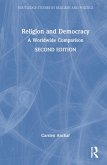This volume examines the enduring nature of religious nationalism in modern Europe. Through a series of in-depth case studies covering Ireland, England, Poland, and Greece; the author argues that religious frontiers, or geographic lines of division between different and unique religions, are central to the formation of religiously-based national identities. Typically, as states develop economically and politically, religion plays a lesser role in both individual lives and national identity. However, at religious frontiers, religion becomes useful for differentiating and mobilizing groups of people. This is particularly true when the religious frontier also represents a threat or conflict. Although religion may not be the root of conflict in these instances, the conflict takes on religious tones because of its ability to unite an otherwise diverse population. Religion takes precedence over language, culture, or other national building-blocks because the "other" can best be distinguished in religious terms. The in-depth case studies allow for a deep historical understanding of the processes which converge to create a modern religious nation. Greatly expanding our current understanding of the conditions in which religious nationalism develops, this important book has implications for our understanding of religion and politics, secularization, European politics and foreign policy.
Hinweis: Dieser Artikel kann nur an eine deutsche Lieferadresse ausgeliefert werden.
Hinweis: Dieser Artikel kann nur an eine deutsche Lieferadresse ausgeliefert werden.








